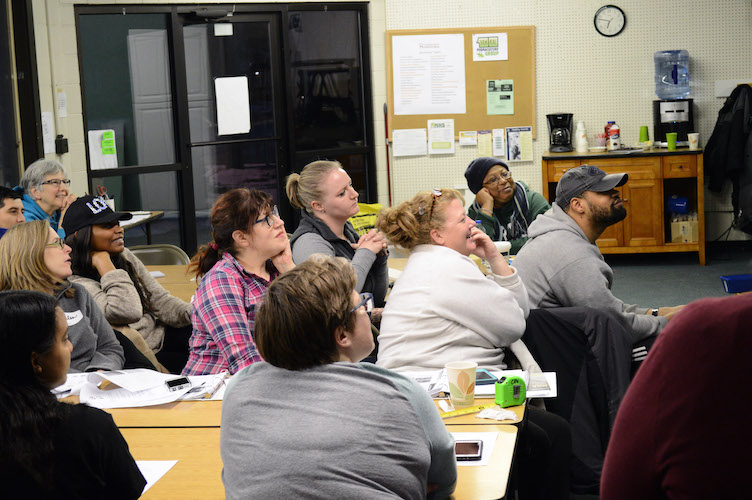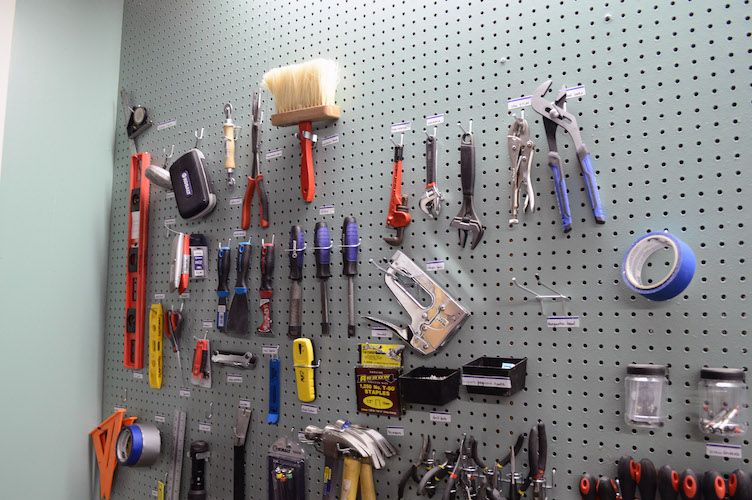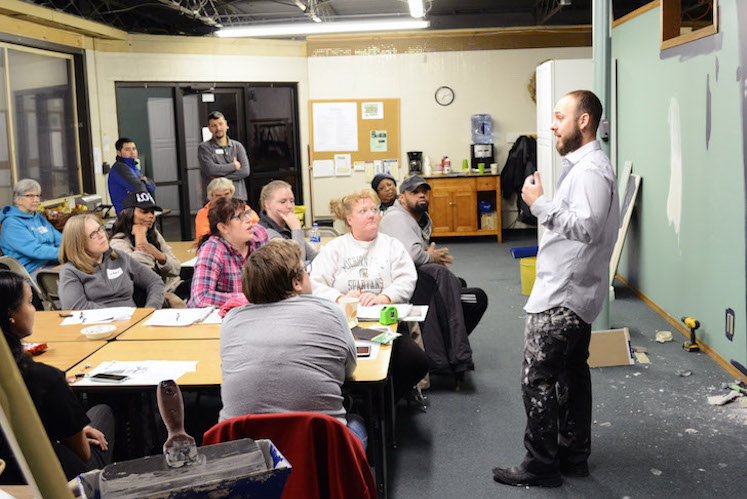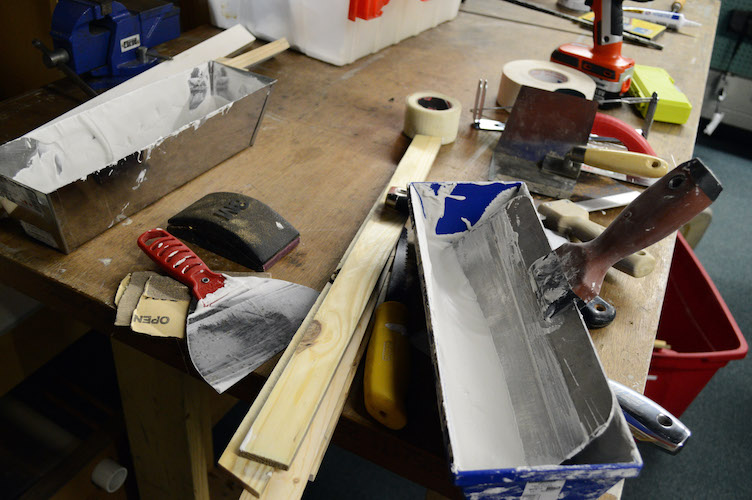Community Homeworks puts the power (tools) in the hands of homeowners
Confidence with power tools and more is empowering for Community Homeworks participants in Kalamazoo.
It’s all about empowerment.
Community Homeworks has been helping Kalamazoo homeowners DIY since 2009.
The Kalamazoo nonprofit helps low-income residents with critical repair — if there is a major problem that could affect the safety and wellbeing of a home, they’ll repair it.
But they also educate residents to do-it-yourself. Classes in everything from lawn care to furnace maintenance are held once a week at their Bryant Street building in the Edison neighborhood.
Education manager Jason Byler says he’s seen a lot of people coming in helpless and timid around basic tools, and leaving with a new confidence.
He knew of a couple seeking help from Community Homeworks who were about to give up. “They were planning to trade somebody their home for a used car,” Byler says. “They were in over their heads with home repairs and didn’t know how to do them.”
The couple came to their first class, on wall repair, talking of a contractor’s $3,000 estimate to fix their walls. “I don’t understand why they were charging us, because this isn’t hard to do!” they told Byler afterward. “As far as I know, they’re still in their home.”
Byler then speaks of a single mom, “the poster person for empowerment.” She hired a contractor to tile her kitchen. After the job was done, she found new tile was laid directly on top of carpet that should’ve been removed first.
“She got home and was like, ‘That’s not right!’ But she didn’t have the knowledge to tell them what they should’ve done, and point out what was wrong. Then the tiles started popping up; she tried to contact them, and they were out of business.”
The woman and her son taught themselves how to work with tile, and did it themselves. Now she, Bette Carlson, teaches tile classes for Community Homeworks — “an amazing person,” he says.
‘If I can do it, you can do it.’
Jake Tardani was teaching a Tuesday night class in the mysteries of the mud, the pan and the knife — the art of drywall.
It’s as easy as his old job as a restaurant dishwasher, he says. A woman in the class mentions it’s just like frosting a cake.
The Community Homeworks classroom has a demonstration wall, in which someone conveniently smashed a couple holes into an earlier class’s interior painting. Tardani shows how easy it is to spread mud — drywall compound — into and over the hole in layers until it’s filled. He lays a foundation of lath and drywall tape in a bigger hole before spreading the mud.
He then has class volunteers working the knife, filling the holes. When they were done, other volunteers gleefully smashed holes in the wall with hammers, for more practice opportunities.
“If I can do it, you can do it,” Tardani says. He’s an insurance agent with a side business in real estate. He learned to do repair on his properties. “I just fell in love with houses and drywall, and fixing things. Hopefully this inspires you to get hands-on, because a lot of people look at drywall and they’re like so timid at how to fix a hole in the wall like that,” he tells the class.
Twala Lockett Jones of Eastwood was tentative when spreading the mud on the wall, but she got the hang of it. “My husband’s very handy, but he’s not a good teacher,” she says later. She wanted to DIY, but a repair “like that would normally intimidate me. But I think in a classroom setting like this I feel more comfortable.”
Community Homeworks classes are judgement-free zones.
Full Disclosure: My wife has become a fan of the classes, and dragged me out on a Saturday morning in February to learn to make interior storm windows.
There’s a reason why I work with words and not hammers. The windows were just plain wood frames with insulating plastic, but it was the most-complex thing I’ve made since high school wood shop. There was some split wood as I screwed the frames together, but as that day’s instructor Sam Ewbank says, “We’re not making violins, here.”
Students aren’t expected to have the skills of a professional going in or coming out, Byler says. When they do their first repair, “It’s not going to be perfect, it’s not going to be fancy, but it’ll be functional.”
We took our work home, put them in our drafty upstairs single-pane windows. They fit with 99 percent perfection, and stopped the polar vortex from leaking into our home. Thanks to Community Homeworks, the other day I was dreaming of making screen windows for the summer, and shopping for sharp Japanese saws of the kind Ewbank let us use.
Classes are growing, empowering
Community Homeworks has over 40 classes in its curriculum. Some classes are hands-on repair, others are about the more-complex and risky electrical, heating and plumbing systems — they won’t attempt to teach people how to fix major problems themselves, but “we want them to understand how those things work, so that if they hire somebody, hopefully they understand the system well enough to know if the contractor is trying to take advantage of them,” Byler says.
They are “focusing on empowering low-income homeowners, but we also don’t discriminate. Everybody needs to learn these skills,” Byler says. If students can pay, they’re encouraged to put something in the donation box.
The organization was founded by a contractor, Shaun Wright, who was disillusioned with building $17,000 showers for rich clients, Byler says, and went to work for Habitat for Humanity. There, Wright developed a program to help educate new homeowners about maintenance and repair.
“Not really anybody in our community does work with existing homeowners to keep their homes up. That’s why he started Community Homeworks,” Byler says.
The organization first had space in a small storefront in the Vine neighborhood, then moved to basement classrooms at Trinity Lutheran Church.
Hands-on demonstrations were limited. “We couldn’t really, in the church, break holes in the wall and patch them. They kinda frowned on that,” Byler says, laughing.
They moved to the Edison building in 2013. Since then the classes have been “growing, growing, growing,” to the point where they’re planning on expanding the space. “We’re constantly looking at new ways to do hands-on educational things with folks.”
Again, Byler says they want to eliminate the intimidation homeowners might have, that drives them to spend thousands of dollars on professionals.
“Most home repairs are not that big a deal. Things like heating, electrical and plumbing, those can get into some big-deal things, but there are a lot of maintenance things you can do to keep those systems running well.”
It’s all in Community Homework’s mission statement, he says: “Empowering folks to maintain safe, sustainable and dignified homes.”




















